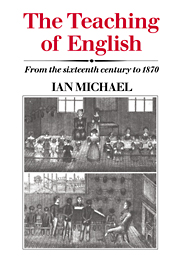Book contents
- Frontmatter
- Contents
- List of tables
- Preface
- 1 The enquiry: scope, method, texts
- 2 Reading, spelling, pronunciation: the elements
- 3 Reading, spelling, pronunciation: the skills
- 4 Interpretation: literature presented
- 5 Interpretation: literature taught
- 6 Expression and performance
- 7 Linguistic control
- 8 English: the development of a subject
- Abbreviations
- Bibliography 1
- Bibliography 2
- Bibliography 3
- Bibliography 4
- Index
6 - Expression and performance
Published online by Cambridge University Press: 05 June 2012
- Frontmatter
- Contents
- List of tables
- Preface
- 1 The enquiry: scope, method, texts
- 2 Reading, spelling, pronunciation: the elements
- 3 Reading, spelling, pronunciation: the skills
- 4 Interpretation: literature presented
- 5 Interpretation: literature taught
- 6 Expression and performance
- 7 Linguistic control
- 8 English: the development of a subject
- Abbreviations
- Bibliography 1
- Bibliography 2
- Bibliography 3
- Bibliography 4
- Index
Summary
The skills
Before 1700 it is difficult even to guess how much attention was paid in school to the skill of expressing yourself orally, in English and in your own words. We may assume that in a sixteenth-century school for young children the pupils, if they were happy with the teacher, would want to talk and might be encouraged to do so. But we may not assume that such encouragement would be part of any intention to develop their expressive skill. What we know of attitudes to children, to learning and to language make such an intention most improbable. In sixteenth-century grammar schools the boys were often forbidden by statute to speak English even out of school, though the prohibition was probably not meant to be absolute and was always impracticable. It signifies the importance attached to Latin, not necessarily a low status accorded to English.
The main task of the schoolboy student of rhetoric was learning how to express himself orally and in writing in Latin and, to a lesser but steadily increasing extent, in English. The component skills of expressive rhetoric can be summarised; they were not, of course, exercised consecutively:
(i) Having a supply of ideas and arguments to put forward. One way of making sure that you had overlooked nothing was to use a checklist, derived from Aristotle, which purported to present all the fundamental questions that could be asked about any matter.
(ii)Having a supply of words in which to put forward your ideas and arguments. This meant not only the possession of a wide vocabulary but also skill in recognising and handling slight differences of meaning.
(iii)[…]
- Type
- Chapter
- Information
- The Teaching of EnglishFrom the Sixteenth Century to 1870, pp. 268 - 316Publisher: Cambridge University PressPrint publication year: 1987

